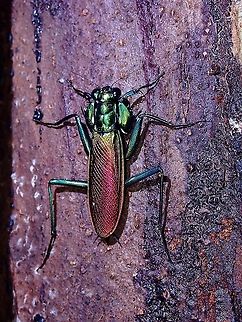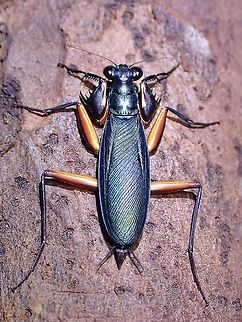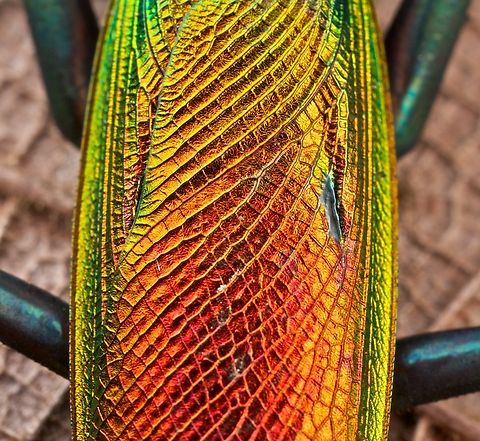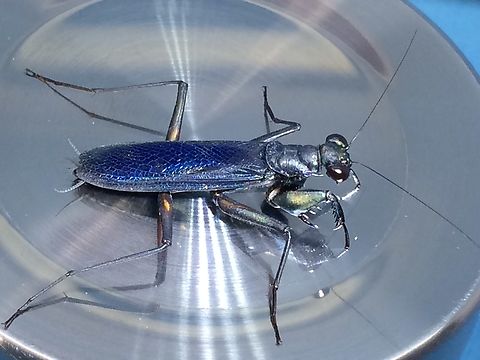
Appearance
''M. splendidus'' was originally described by J. O. Westwood in 1835 as having a short, oval-shaped body, a blunt head, thick anterior femora, round eyes, and simple antennae. In the same work, Westwood described the genus ''Metallyticus'' as distinct from other mantis genera by the iridescent color, short pronotum, and the exposed tip of the abdomen when wings are closed. Ermanno Giglio-Tos added additional descriptions of ''M. splendidus'' in 1927, noting the presence of yellow marks on the legs and vertex, and providing a description of the smoky, blackish wings.Males and females of ''M. splendidus'' differ in coloration and size long whiles males measure 21 millimetres ).
''M. splendidus'' has been described as a basal mantis, though some systematists argue that the application of this term to extant taxa can be misleading. Several morphological traits of ''M. splendidus are'' plesiomorphic, such as its short prothorax and lack of discoidal spines. ''M. splendidus'' also have less ventral cervical sclerites than other species in their genus. Other traits of ''M. splendidus'' and other ''Metallyticus'' species are autapomorphic, including the metallic coloration and large outer spine on the front femur. ''M. splendidus'' has been represented in morphological and molecular phylogenies, which have shown it to be nested within the monophyletic family Metallycidae, though the position of this family with respect to other mantis lineages remains in question.

Behavior
The iridescent bark mantis is an active hunter both day and night. Its usual habitat is dead trees , where its prey are likely to be found. While nymphs have been reported on the surface of bark, adult ''M. splendidus'' individuals tend to be found underneath the bark, feeding on butterflies, termites, flies, and mainly cockroaches. They typically dart to catch prey and bring them back to a crevice to feed, rather than ambushing them like most mantis species. When running, this species also uses all six legs rather than holding the foremost pair aloft like many other mantises.
Habitat
The iridescent bark mantis is an active hunter both day and night. Its usual habitat is dead trees , where its prey are likely to be found. While nymphs have been reported on the surface of bark, adult ''M. splendidus'' individuals tend to be found underneath the bark, feeding on butterflies, termites, flies, and mainly cockroaches. They typically dart to catch prey and bring them back to a crevice to feed, rather than ambushing them like most mantis species. When running, this species also uses all six legs rather than holding the foremost pair aloft like many other mantises.
Reproduction
The egg of ''M. splendidus'' is roughly shaped like a prolate spheroid, with a slight anterior constriction and concave dorsal side. Eggs measure about 3.2 millimetres long and 1 millimetre wide. A U-shaped fissure from which larvae rupture the eggshell, known as the hatching line, is present at the anterior pole of the egg. When raised at room temperature, eggs typically take 80-90 days to hatch. Eggs are laid in egg cases in groups of 20-30.References:
Some text fragments are auto parsed from Wikipedia.